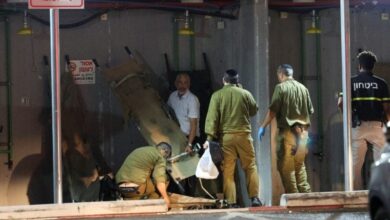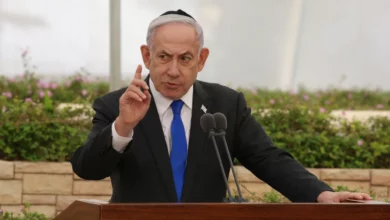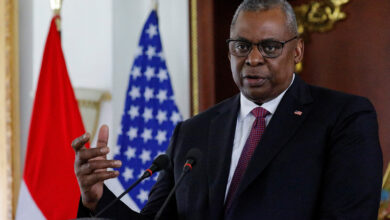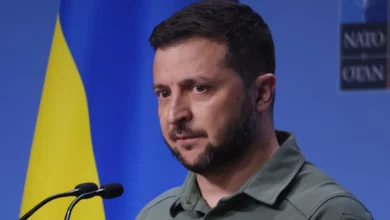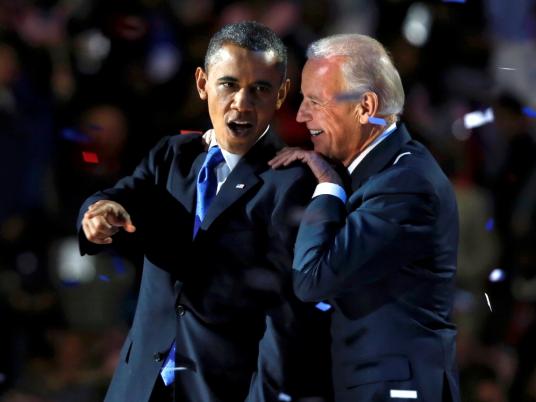
US Vice President Joe Biden met Ukraine's new pro-Western leaders Tuesday to offer firm American backing as Washington and Moscow traded blame over an unravelling peace deal to defuse the country's deep crisis.
Biden began by meeting acting President Oleksandr Turchynov in Kiev's parliament building, with US officials saying that the onus was firmly on Moscow to fulfil the accord meant to reduce tensions in the worst East-West confrontation since the Cold War.
Under the deal signed by Ukraine, Russia, the United States and the European Union last week, pro-Kremlin rebels holding a string of eastern towns were supposed to disarm and give up the state buildings they have seized.
The United States and Russia put a radically different spin on a crunch telephone call between their diplomatic chiefs on reviving the accord reached last week in Geneva.
US Secretary of State John Kerry called on Moscow to put pressure on the pro-Russian separatists, which Washington sees as backed by the Kremlin.
However, Russian Foreign Minister Sergei Lavrov urged Washington to influence the Ukrainian government, which Moscow accuses of "grossly breaching" the Geneva deal.
Kerry told Lavrov that "concrete steps" to defuse the crisis should include "publicly calling on separatists to vacate illegal buildings and checkpoints, accept amnesty and address their grievances politically", said State Department spokeswoman Jen Psaki.
US ambassador to Kiev Geoffrey Pyatt told journalists Monday that "the ball is really in Moscow's court" over making the agreement work and said Washington would take "days not weeks" to assess the implementation of the accord.
In Moscow, the foreign ministry said Lavrov had asked Kerry to "pressure Kiev to stop hotheads from provoking a bloody conflict and to encourage the Ukrainian authorities to strictly fulfil their obligations".
Lavrov also accused Ukraine's government of an "inability and unwillingness" to rein in Pravy Sektor ("Right Sector"), an ultra-nationalist group the separatists blamed for an attack Sunday on one of their checkpoints near the flashpoint town of Slavyansk.
Funerals of at least two pro-Moscow rebels killed in the gunbattle were set to take place in the town Tuesday in an emotive ceremony that could stoke additional anger in the east.
Military moves, sanctions
US President Barack Obama has threatened more sanctions on Moscow if the Geneva accord is not implemented soon, beyond those already imposed by the United States and the European Union.
White House press secretary Jay Carney said Monday that Washington was ready to make good on its threat, warning that "if progress is not made in coming days we will impose further costs".
But Lavrov said it was the Ukrainian government — which took office after the ouster of the pro-Kremlin president in February — that was violating the deal and told reporters that sanctions would fail.
"Attempts to isolate Russia have absolutely no future because isolating Russia from the rest of the world is impossible," he said.
His country, he said, was "a great power, independent, and it knows what it wants".
Russia, which annexed Ukraine's Crimea peninsula last month after sending in troops, has massed a military force estimated at 40,000 soldiers on Ukraine's eastern border.
The United States and NATO have responded by boosting their own forces in eastern Europe.
But Obama's preferred weapon is sanctions. Those imposed up to now, barring travel and freezing assets of Putin allies and friends, have however had little impact on Russia's actions.
The EU is divided on going further, with some member states worried that increased punishment could jeopardise supplies of Russian gas.
'We are defending ourselves'
Across Ukraine's east, the insurgents remained firmly entrenched in public buildings they have occupied for more than a week.
In a sign that they are in no mood to back down, an AFP journalist reported from the town of Kramatorsk Tuesday that separatist gunmen had moved in overnight to surround the local police station.
Elsewhere, in the town of Lugansk, close to the Russian border, protesters who have been occupying local security buildings staged a fiery mass demonstration Monday and pledged to hold a referendum on autonomy on May 11, Interfax-Ukraine news agency reported.
Although highly trained military personnel whose camouflage uniforms are stripped of all insignia have been seen helping the rebels secure the some 10 towns they hold, Russian President Vladimir Putin denies they are Russian special forces — a stance echoed by the self-declared mayor of rebel-held Slavyansk.
"There is not a single representative of the Russian armed forces here. Nor of the state structures of Russia," said Vyacheslav Ponomaryov, blaming the Ukrainian authorities for the hostilities.
"If they had not come to us we wouldn't need any weapons. We are defending ourselves," he told AFP.
However, the US State Department released images Monday it claimed proves armed separatists in eastern Ukraine are actually Russian military or intelligence officers.
The photos, said the state department, showed a military fighter with a distinctive red beard seen in Georgia in 2008 — when Russia invaded — wearing the insignia of a Russian special forces unit. The same man is also pictured in Crimea and Slavyansk.
Other images from Slavyansk show men carrying the same kind of RPG-26 rocket launchers issued to Russian troops.
Psaki said it was "just further evidence of the connection between Russia and the armed militants".
Meanwhile, Viktor Yanukovych — the Kremlin-backed president toppled in the wave of the pro-EU protests that unleashed the current crisis — demanded Kiev withdraw its armed forces from the separatist east to avoid a "bloodbath", the Russian news agency RIA Novosti reported.
Ukraine's new government last week launched a military operation to try to dislodge the separatists, but failing badly to do so it put it on hold until at least Tuesday, after the Easter holiday.

